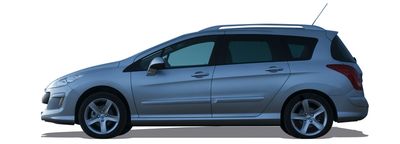Table of Contents
Peugeot 308 engines
Since its market launch in 2007, the Peugeot 308 has established itself as one of the French manufacturer's most successful compact cars and has gone through three generations with an impressive variety of engines. The Peugeot 308 engines reflect the technological evolution from classic naturally aspirated engines to modern turbo engines and highly efficient hybrid drives.

Peugeot 308 Generation I (2007-2013)

The first Peugeot 308 generation was characterized by proven but partly outdated engine concepts and showed the typical strengths and weaknesses of French engineering of this era. Mileage varied considerably: while the robust HDi diesels easily reached 300,000 to 400,000 kilometers with proper maintenance, the petrol engines often required costly repairs to the timing chain or camshaft phaser between 150,000 and 200,000 kilometers. The absolute top engine of this generation was the 2.0 HDi with 163 hp, which optimally combined power, reliability and economy. Technically, this generation was still characterized by older PSA concepts, with partly complex electronics and susceptible sensors, which were, however, compensated for by solid basic constructions.
Peugeot 308 petrol engines: Generation I (2007-2013)
The Peugeot 308 petrol engine range comprised various naturally aspirated engines from the TU and THP series. The 1.4 VTi with 95 hp served as the entry-level engine, followed by the 1.6 VTi with 120 hp. These Peugeot 308 engines were considered reliable, but not very economical and not particularly powerful. Much more interesting was the 1.6 THP with 140 hp and later 156 hp, which was the first turbo petrol engine in the series to offer a good power output. However, this engine suffered from typical problems such as timing chain problems, defective camshaft phasers and occasional turbocharger damage. The most powerful Peugeot 308 petrol engine was the 1.6 THP with 200 hp in the GTi model, which had similar weaknesses despite its sportiness.
Peugeot 308 diesel engines: Generation I (2007-2013)
The Peugeot 308 diesels were dominated by the proven HDi technology with common-rail injection. The 1.4 HDi with 68 hp was designed as an economy engine, but was not very popular. Much more popular were the 1.6 HDi engines with 90 hp and 110 hp, which proved to be very reliable and economical. The Peugeot 308 2.0 HDi with 136 hp and later 163 hp developed into the most reliable engine of the entire generation - especially the variants produced from 2009 onwards with improved emission control and particulate filter showed excellent long-term durability. These Peugeot 308 HDi engines already met the Euro 5 standard and offered an excellent combination of performance, consumption and reliability.
| Peugeot 308 engine | Power output | Fuel consumption | Typical weaknesses | Rating |
|---|---|---|---|---|
| 1.4 VTi | 95 HP | 7.2-7.8 l/100km | Little power, high consumption | Average |
| 1.6 VTi | 120 HP | 6.8-7.4 l/100km | Consumption, outdated technology | Average |
| 1.6 THP | 140-200 HP | 6.5-8.2 l/100km | Timing chain, camshaft phaser | Moderate |
| 1.4 HDi | 68 HP | 4.2-4.8 l/100km | Little power, rare | Average |
| 1.6 HDi | 90-110 HP | 4.5-5.2 l/100km | Very robust and economical | Very good |
| 2.0 HDi | 136-163 HP | 5.1-5.8 l/100km | Excellent reliability | Very good |

Peugeot 308 Generation II (2013-2021)

The second generation Peugeot 308 marked a revolutionary change and is considered a technological milestone for PSA. Most of the engines of this generation can easily reach 250,000 to 300,000 kilometers with proper maintenance, with the smaller PureTech petrol engines being surprisingly durable. The BlueHDi diesels set new standards in terms of efficiency and cleanliness, while the powerful THP engines continued to show weaknesses. The absolute highlight was the 1.6 BlueHDi with 120 hp - a technical masterpiece that perfectly combined power, efficiency and reliability. This generation also introduced the PureTech petrol engines, which offered impressive power and efficiency despite their small displacement.
Peugeot 308 petrol engines: Generation II (2013-2021)
The Peugeot 308 petrol engine range was completely revised and was now based on the new PureTech engines. The 1.2 PureTech was available with 82 hp, 110 hp and 130 hp and replaced the older naturally aspirated engines. These small Peugeot 308 PureTech engines proved to be surprisingly reliable and economical, with only occasional timing chain problems after high mileage. For sporty drivers, there was still the 1.6 THP with 205 hp and later 270 hp in the GTi model. However, the Peugeot 308 1.6 THP remained the most problematic engine of this generation, with frequent reports of timing chain damage, defective camshaft phasers and turbocharger damage during sporty driving.
Peugeot 308 diesel engines: Generation II (2013-2021)
The Peugeot 308 BlueHDi (DV6 and DW10) was offered in various power levels from 100 to 180 hp. These completely newly developed engines featured state-of-the-art common rail injection with SCR catalytic converter and particulate filter. The Peugeot 308 1.6 BlueHDi with 120 hp proved to be the most reliable and efficient engine of this generation, with a test consumption of only 3.8-4.2 liters per 100 km and high reliability. The more powerful 2.0 BlueHDi with 150 hp and 180 hp also demonstrated excellent long-term durability and was ideal for frequent drivers and trailer operation.
| Peugeot 308 engine | Power output | Fuel consumption | Typical weaknesses | Rating |
|---|---|---|---|---|
| 1.2 PureTech | 82-130 HP | 4.8-5.6 l/100km | Occasional timing chain | Good |
| 1.6 THP | 205-270 HP | 6.8-8.1 l/100km | Timing chain, camshafts, turbo | Problematic |
| 1.6 BlueHDi | 100-120 HP | 3.6-4.2 l/100km | Very robust and economical | Very good |
| 2.0 BlueHDi | 150-180 HP | 4.1-4.8 l/100km | Excellent reliability | Very good |

Peugeot 308 Generation III (2021-today)

The current Peugeot 308 generation is fully electrified and represents Peugeot's vision for the future of combustion engines. All petrol engines are now equipped with modern turbo technology, while the plug-in hybrids offer an electric range of up to 60 kilometers. As the generation has only been on the market since 2021, there is no long-term experience yet, but the first tests show promising approaches. The top-of-the-range engine is the Hybrid 225 with 225 hp system output, which combines sporty driving performance with high efficiency. The new PureTech generation promises a service life of over 300,000 kilometers, as the engines have been revised from the ground up and benefit from the experience of the previous generation.
Peugeot 308 petrol engines: Generation III (2021-today)
The Peugeot 308 engine range is based on two 1.2 PureTech engines with 110 hp and 130 hp. Both Peugeot 308 engines feature state-of-the-art turbo technology with direct fuel injection and variable valve timing. The Peugeot 308 1.2 PureTech with 130 hp is considered to be particularly successful and is developing into the best engine of this generation - it offers smooth power delivery over a wide rev range and has so far been free of major series production problems. The timing chain problems of its predecessors have been largely eliminated thanks to an improved design.
Peugeot 308 plug-in hybrids: Generation III (2021-today)
The Peugeot 308 Hybrid variants offer system outputs of 180 hp and 225 hp with up to 60 km electric range. These Peugeot 308 engines combine a 1.6 PureTech engine with an electric motor and offer impressive efficiency with high performance. The Hybrid 225 is becoming the technical pinnacle of the range, but is complex to maintain.
Peugeot 308 diesel engines: Generation III (2021-today)
A single Peugeot 308 1.5 BlueHDi engine with 130 hp is available, continuing the tradition of reliable Peugeot 308 diesels. This engine is based on the proven BlueHDi technology and offers a fuel consumption of only 4.2-4.6 liters per 100 km with high reliability.
| Peugeot 308 engine | Power output | Fuel consumption | Typical weaknesses | Rating |
|---|---|---|---|---|
| 1.2 PureTech | 110-130 HP | 5.2-5.8 l/100km | No series problems so far | Very good |
| 1.5 BlueHDi | 130 HP | 4.2-4.6 l/100km | Robust, proven | Very good |
| Hybrid 180 | 180 HP | 1.3 l/100km + electricity | Complex but efficient | Good |
| Hybrid 225 | 225 HP | 1.4 l/100km + electricity | Complex, sporty | Good |

Conclusion: The best Peugeot 308 engines of all generations
The development of Peugeot 308 engines shows an impressive technological evolution - from the proven but outdated concepts of the first generation to the revolutionary PureTech and BlueHDi engines of the second generation and the ultra-modern hybrid drives of the third generation. While the Peugeot 308 diesel engines have impressed with their exceptional reliability and economy across all generations, the petrol engines have also continued to develop and have reached a new level of quality with the current PureTech engines.
- Best Peugeot 308 gasoline engine:
The Peugeot 308 1.2 PureTech (130 hp, Generation III) combines modern turbo technology with high efficiency and excellent reliability to date.
- Best Peugeot 308 diesel engine:
The Peugeot 308 1.6 BlueHDi (120 hp, Generation II) offers the best combination of reliability, economy and everyday usability across all generations.
- Best Peugeot 308 hybrid engine:
The Peugeot 308 Hybrid 225 (225 hp, Generation III) with its high electric range of up to 60 km and low fuel consumption.
For maintenance and spare parts for all Peugeot 308 generations, AUTODOC offers a comprehensive range of original and quality spare parts with fast delivery.
TOP Products on the topic:















